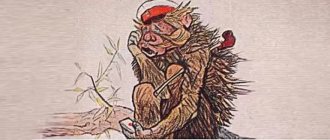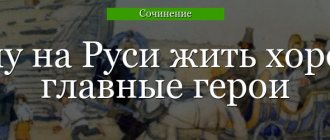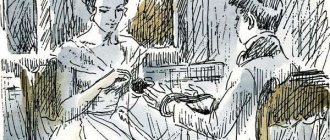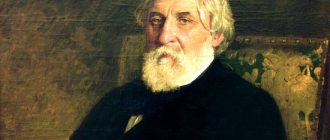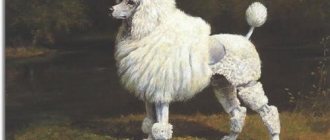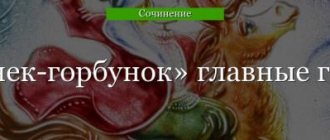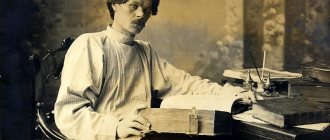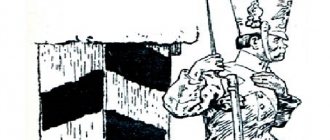Every writer strives to create in his works a type of woman that would express his ideas about the ideal heroine. Such are Pushkin’s Tatyana Larina, Turgenev’s girls: Liza Kapitana, Natalya Lasunskaya, Elena Stakhova. These wonderful heroines, who embodied the best features of the Russian character, were generated by the nobility. Nekrasov introduces a new heroine into his poems and poems - a peasant woman who combines the moral purity characteristic of noble girls and hard work, perseverance, and strength of character, which are formed precisely by the peasant environment.
In the poet’s early poems we see, as it were, the first sketches of the future bright and expressive image of the “majestic Slavic woman.” Nekrasov’s first poem, which brought him fame, “On the Road,” is dedicated to the fate of the peasant girl Grusha, who was ruined by the gentlemen with their apparent kindness. Having given her a noble upbringing and education, they then returned her to the peasant environment, from which she had completely alienated herself. This dramatic fate of an educated girl from the people, dependent on the whim of the master, appears before us in the story of her husband, the coachman. The fates of Russian peasant women are surprisingly similar to each other in that they are filled to the brim with grief, resentment, humiliation, and backbreaking labor. Therefore, in the poem “Troika ,” drawing a charming portrait of a “black-browed savage,” the author sadly foresees her future life, which will turn this charming creature full of life into an early aged woman, in whose face “an expression of dull patience and senseless eternal fear will suddenly appear.” . Thus, drawing images of peasant women, the author persistently asserts the idea that unbearable living conditions, lack of rights, and slavery ruin their destinies, cripple their souls, in which strength is uselessly extinguished, desires and aspirations are killed. The poem “The village suffering is in full swing” tells about the hard lot of women. The basis of the life of the nameless heroine of this poem is endless hard labor, which exhausts her strength and does not allow her to rest.
The poor woman is exhausted, A column of insects sways above her, Stings, tickles, buzzes!
Lifting the heavy roe deer, Baba cut the naked leg - There was no time to stop the bleeding!
This realistically drawn picture gives a vivid idea of the life of a free peasant woman, for the poem was written in 1862, that is, after the abolition of serfdom. The fate of the Russian woman from the people still remains difficult. But these unbearable conditions strengthen a woman’s character, forcing her to endure life’s trials with steadfastness.
Daria from the poem “Frost, Red Nose” befalls a terrible grief - the death of her husband, breadwinner, support and hope of the family. But it is not only the poverty that threatens in the near future that is drying up Daria. The worst thing for her is the loss of her beloved husband. Pride forces her to hold back the approaching tears, which nevertheless spill onto the “coffin canvas.” Daria's courageous and persistent character is manifested in the fact that she herself sews a shroud for her deceased husband, carefully takes the children to a neighbor, and goes to the forest for firewood immediately after the funeral. Pictures of Daria's dying dream reveal with particular force her high moral qualities - devoted love for her husband and children, hard work, willpower. To express his deep sympathy for the heroine, the author uses epithets such as “bitter widow”, “young widow” to create her image, and affectionately calls her “Daryushka”. The poet uses a metaphor here in a very unexpected way. The tears of the crying Daria either fall like rain, then flow out like overripe grains, or harden into pearls. Mentally speaking to her husband, endlessly grieving for him, Daria courageously faces trouble, taking care of the children. But she is so accustomed to sharing her joys and sorrows with Proclus that even after his death, thinking about her son’s upcoming wedding, she addresses her deceased husband as if he were alive.
Didn’t I try to take care of him? Did I regret anything? I was afraid to tell him how much I loved him!
How much tenderness, love, care, affection and warmth is contained in these simple, artless words! Even hard peasant work is painted with light, joyful tones in the picture of the heroine’s dying dream, because in it next to her are those who are dearest to her: a caring, hardworking husband, a nimble little son Grishukha, a beautiful Masha the playful girl. This bright, festive picture is the last thing the freezing Daria sees. Only in death does she find peace and happiness, for life promises her only hopeless need and grief. This means that Daria’s misfortune reflected the tragedy of many peasant women: wives, sisters, mothers. It is not for nothing that in the poem the author’s narration about the sad fate of the heroine is interrupted by the poet’s excited monologue about Russian peasant women. In it, he paints a generalized image of a “majestic Slavic woman” who “will stop a galloping horse and enter a burning hut.”
. A beauty, a wonder to the world, Blush, slender, tall, Beautiful in all clothes, dexterous in any work.
She endures both hunger and cold, she is always patient and even. I saw how she mows: With a wave, the mop is ready!
This bright, expressive portrait reveals the high moral traits of a peasant woman: strength, endurance, hard work, integrity of character, modesty, dignity. The Russian peasant woman, crushed by backbreaking labor, nevertheless managed to preserve a free heart, strength of spirit, physical and spiritual beauty even in slavery. Perhaps, these features of a Russian woman from the people were most fully embodied in the image of Matryona Timofeevna Korchagina from the poem “Who Lives Well in Russia . But there is also something new in her that distinguishes her from other heroines of Nekrasov. She protests against her slave position and actively fights for her happiness. Actually, Matryona Timofeevna’s whole life, which she tells the truth-seekers about, is an endless stubborn struggle with grief, injustice, humiliation, and lawlessness. Introducing readers to his heroine, Nekrasov gives her portrait, which expresses the popular idea of female beauty.
Matryona Timofeevna, a dignified woman, broad and dense, about thirty-eight years old. She is beautiful: her hair is streaked with gray, her eyes are large and stern, her eyelashes are rich, she is stern and dark.
The entire appearance of Nekrasov’s heroine is full of dignity and calm restraint. In her life, short joys were replaced by severe misfortunes, which, however, did not break her strong nature. The enormous spiritual powers of this woman helped her endure the terrible death of her first-born Demushka, they gave her the strength to protect her second son Fedotushka from cruel punishment, and to achieve the abolition of her husband’s illegal conscription. She achieved her relative well-being herself, bravely struggling with troubles and adversity, defending her human dignity. Matryona Timofeevna's story about her life is crowned with a parable about the keys to women's happiness.
The keys to female happiness, From our free will, Abandoned, lost from God himself.
In Nekrasov’s poem there is an optimistic thought that the “keys” must be found, for the Russian peasant woman deserves a happy and free life, which will help realize her rich moral powers, finding worthy use for them.
Russian peasant women
We continue to describe the summary. Nekrasov (“Frost, Red Nose”) has always been attracted to Russian peasant women. In his works, he admired their strength, endurance, and courage. There are three difficult fates: to marry a slave, to submit to a slave until the grave, and to be the mother of a slave-son. All this fell to the lot of the Russian peasant woman. However, despite the suffering, there are women in Russian villages to whom the dirt does not seem to stick. These beauties bloom as a wonder to the world, enduring both cold and hunger evenly and patiently, while remaining beautiful in all clothes and dexterous in their work. They do not like idleness on weekdays, but on holidays their face lights up with a cheerful smile and such a hearty laugh that money cannot buy. A woman in Rus' will enter a burning hut and stop a galloping horse. There is a sense of strict efficiency and inner strength in her. The Russian peasant woman is sure that her salvation lies in work. Therefore, she does not feel sorry for the wretched beggar walking around idle. She is fully rewarded for her work: the peasant woman’s family knows no need, the children are well-fed and healthy, the house is always warm, there is an extra piece for the holiday.
Other characters
Proclus
- Daria's husband, breadwinner, died from severe hypothermia.
Proclus's parents
– elderly people whose only son died, their hope and support.
Masha and Grisha
- the little children of Daria and Proclus, who became orphans.
Part one. Death of a Peasant
Chapters 1-5
An old sleigh with a coffin is stuck in a snowdrift, and the old woman is trying to free it. She takes them home, to a poor peasant hut, where Proclus, the head of the family, lies dead. His small, stupid children make noise, and his wife Daria, quietly sobbing, sews “pieces of linen onto the shroud.”
The fate of a simple Russian woman is unenviable - to marry a slave, “to be the mother of a slave’s son,” and to be submissive to the slave until her death. Over time, everything changes, and no one can change the “harsh lot of the peasant woman.”
Meanwhile, “in Russian villages” there are many beautiful women - beautiful, hardworking, compassionate, patient, capable of enduring all the hardships of fate with great dignity.
Chapters 6-10
Four miles from the village there is a church. Next to her, Father Proclus chooses a place for the grave - “so that the cross can be seen from the road, so that the sun plays all around.” It’s hard for the old man to dig the frozen ground, but he doesn’t stop. Having completed his work, he returns home sadly.
On the way, the old man catches up with his wife, who was carrying her son’s coffin on a sleigh. Suddenly, “an old acquaintance Pakhom” appears in front of the spouses - the blessed one, who reassures the old people that Proclus has already suffered in this life.
Returning home, the old people send their grandchildren - Masha and Grisha - to their neighbors, and begin to prepare their deceased son for his last journey. Neighbors gather to hear the parents' "sobs and groans" to say goodbye to Proclus for the last time. “All night long, standing by the candle,” the sexton reads prayers over the body of the deceased.
Chapters 10-15
The next morning, “without unnecessary speeches, without sobs, the people carried out the dead man.” In the harnessed sleigh stands the faithful Savraska, whom Proclus bought as a foal. Together with the owner, the horse worked hard both in winter and in summer, and now he will have to serve Proclus for the last time.
It was Savraska who unwittingly witnessed how the owner, who had stood in a snowdrift for half a day and then walked for three days behind a cart, became very ill. Proclus “was in a hurry to deliver the goods to the place”, but when he returned home he immediately fell ill. Neither a hot bath, nor a dip in an ice hole, nor tinctures of sorcerers could restore his health. Daria went “to a distant monastery” for a healing icon, but by her return Proclus had died.
A small funeral procession sets off. The neighbors feel sorry for Daria and the little orphans, who will face “dark days” after the death of their breadwinner. Returning after the funeral, Daria wanted to caress the children, but the hut was not heated, and the unfortunate woman went “to the forest to get firewood.”
Part two. Jack Frost
Chapters 16-24
The forest is quiet and sad, the snow sparkles dazzlingly, everything evokes “dead, grave peace.” Daria gives vent to her grief and begins to sob - no one here will hear her. Having cried, the young widow begins to chop and chop wood. She never stops thinking about her deceased husband, with whom she mentally conducts a dialogue.
The woman understands that now all the hard work that they shared in half with Proclus will fall on her shoulders. She also worries about the children left without their main protector.
Chapters 25-28
Daria remembers how at night she went alone to the monastery to bring a miraculous icon to her dying husband. She had to give away all the modest savings that she and Proclus collected “by a penny, by a copper penny,” but the icon did not heal her husband. Daria was bitter, because the Mother of God helped many people, and only her family was spared with her mercy.
Chapters 29-36
Daria loads a cart full of firewood and is about to head back, but again plunges into sad thoughts. Meanwhile, “Frost the governor is patrolling his possessions.” Noticing Daria, he begins to sing a daring, boastful song about his power and untold riches.
Frost asks the young woman three times if she is warm. Twice she answers that it is warm, although each time the frost gets stronger and stronger, and she “she herself is getting colder, trembling.”
For the third time, the “gray-haired sorcerer” turns into Proclus and begins to kiss Daria “on her mouth, eyes and shoulders.” The woman feels surprisingly light and well, a blissful smile plays on her face. She is already getting cold, but she dreams of a hot summer, happy parents, husband, children. Daria has a child beating under her heart, and life promises to be long and joyful.
The widow's "last signs of agony" disappear from her face. The squirrel showers her with snow from above, but Daria does not react in any way - she slowly freezes “in her enchanted dream”...
Daria's Tears
You are reading a summary of the poem by N.A. Nekrasov "Frost, Red Nose". This is not the text of the work itself. Nikolai Alekseevich's poem is written in verse.
On the way across the plain, glistening with snow, tears appear in Daria’s eyes - probably from the sun... And only when she enters the forest with its graveside peace, a crushing howl breaks out of the girl’s chest. Indifferently the forest listens to the moans of the widow, hiding them forever in the uninhabited wilderness. Daria, without wiping away her tears, begins to chop wood and thinks about her husband, talks to him, calls him. All this is described in detail by Nekrasov N.A. conveys only the main events of the work.
Nekrasov, “Frost, Red Nose”: main characters
Daria is the same Slavic woman whom the author admires in the first part of his work. The poem “Frost, Red Nose” by N. Nekrasov describes this image in detail.
Having tried all the ways to save her dying husband from fever, she goes to a distant monastery to get a miraculous icon. This road is not easy - ten miles through the forest, where there are wolves. But even the icon for which she paid her last money did not return her beloved friend. After his funeral, tired, she goes into the forest to get firewood, where no one will see her grief or tears - she is still proud. Her soul, exhausted by melancholy, is torn. Changes are happening in her. Forgetting about the children, she thinks only about her husband. Freezing with a smile in a happy dream, she sees a sunny summer day when she and her husband worked together.
Proclus, who had just passed away, was the breadwinner and hope of the family.
Hardworking and enterprising, he worked all year: in spring, summer, autumn - on the land, and in winter - as a carrier. He, stately, the strongest, affable and friendly, attentive to his wife, children and parents, was respected by the entire village.
Prophetic dream
The girl remembers the dream she had before Stasov’s day. A countless army surrounded her. Suddenly it turned into rye ears. Daria cried out to her husband for help, but he did not come out. The peasant woman was left alone to reap rye. She understands that this dream turned out to be prophetic, and asks her husband for help in the backbreaking work awaiting her. Daria imagines winter nights without Proclus, endless fabrics that she will weave for her son’s marriage. Along with thoughts about his son, the fear arises that Grisha will be illegally given up as a recruit, since there will be no one to stand up for him.
Poem test
Check your memorization of the summary content with the test:
Retelling rating
Average rating: 4.2. Total ratings received: 213.
There is a terrible grief in the peasant hut: the owner and breadwinner Prokl Sevastyanich has died. The mother brings a coffin for her son, the father goes to the cemetery to dig a grave in the frozen ground. A peasant's widow, Daria, sews a shroud for her late husband.
Fate has three difficult fates: to marry a slave, to be the mother of a slave’s son, and to submit to a slave until the grave - all of them fell on the shoulders of the Russian peasant woman. But despite the suffering, “there are women in Russian villages” to whom the dirt of a wretched situation does not seem to stick. These beauties bloom as a marvel to the world, patiently and evenly enduring both hunger and cold, remaining beautiful in all clothes and dexterous in any work. They do not like idleness on weekdays, but on holidays, when a smile of joy removes the stamp of work from their faces, money cannot buy such heartfelt laughter as theirs. A Russian woman “will stop a galloping horse and enter a burning hut!” You can feel both inner strength and strict efficiency in her. She is sure that all salvation lies in work, and therefore she does not feel sorry for the poor beggar walking around without work. She is rewarded in full for her work: her family knows no need, the children are healthy and well-fed, there is an extra piece for the holiday, the house is always warm.
Daria, the widow of Proclus, was such a woman. But now grief has dried her up, and no matter how hard she tries to hold back her tears, they involuntarily fall onto her quick hands, sewing the shroud.
Having brought their frozen grandchildren, Masha and Grisha, to the neighbors, the mother and father dress up their late son. In this sad matter, no unnecessary words are said, no tears are shed - as if the harsh beauty of the deceased, lying with a burning candle in his head, does not allow crying. And only then, when the last rites are completed, does it become time for lamentations.
On a harsh winter morning, the Savraska takes its owner on his last journey. The horse served his owner a lot: both during peasant work and in winter, going with Proclus as a carrier. While driving a cab, in a hurry to deliver the goods on time, Proclus caught a cold. No matter how the family treated the breadwinner: they doused him with water from nine spindles, took him to a bathhouse, threaded him through a sweaty collar three times, lowered him into an ice hole, put him under a chicken roost, prayed for him to a miraculous icon - Proclus did not get up.
Neighbors, as usual, cry during the funeral, feel sorry for the family, generously praise the deceased, and then go home with God. Returning from the funeral, Daria wants to take pity and caress the orphaned children, but she has no time for affection. She sees that there is not a log of firewood left at home, and, again taking the children to a neighbor, she sets off into the forest on the same Savraska.
On the way through the plain glistening with snow, tears appear in Daria’s eyes - probably from the sun... And only when she enters the grave peace of the forest, a “dull, crushing howl” bursts out of her chest. The forest indifferently listens to the widow's moans, forever hiding them in its uninhabited wilderness. Without wiping away her tears, Daria begins to chop wood “and, full of thoughts about her husband, calls him, speaks to him...”.
She remembers her dream before Stasov's Day. In a dream, she was surrounded by a countless army, which suddenly turned into ears of rye; Daria called out to her husband for help, but he did not come out and left her alone to reap the overripe rye. Daria understands that her dream was prophetic, and asks her husband for help in the backbreaking work that now awaits her. She imagines winter nights without a sweetheart, endless fabrics that she will begin to weave for her son’s marriage. With thoughts of his son comes the fear that Grisha will be unlawfully given up as a recruit, because there will be no one to stand up for him.
Having piled the wood on the woodshed, Daria is getting ready to go home. But then, mechanically taking an ax and quietly, intermittently howling, he approaches the pine tree and freezes under it “without a thought, without a groan, without tears.” And then Frost the Voivode approaches her, walking around his domain. He waves an ice mace over Daria, beckons her to his kingdom, promises to caress and warm her...
Daria is covered with sparkling frost, and she dreams of the recent hot summer. She sees herself digging potatoes in strips by the river. With her are her children, her beloved husband, and a child beating under her heart, who should be born by spring. Shielding herself from the sun, Daria watches as the cart, in which Proclus, Masha, Grisha are sitting, drives further and further...
In her sleep, she hears the sounds of a wonderful song, and the last traces of torment disappear from her face. The song quenches her heart, “it has the limit of lasting happiness.” Oblivion in deep and sweet peace comes to the widow with death, her soul dies to sorrow and passion.
Squirrel drops a lump of snow on her, and Daria freezes “in her enchanted sleep...”.
Frost the Voivode
“Frost, Red Nose” by Nekrasov in a brief summary continues with the fact that Daria, having piled firewood on the firewood, goes home. But then, mechanically taking an ax and intermittently, quietly howling, he approaches the pine tree and freezes under it. Then Frost the Voivode, who is walking around his possessions, approaches her. He waves an ice mace over Daria, calls her to his kingdom, says that he will warm and caress the widow...
Daria is covered with sparkling frost; she dreams of the recent hot summer. A girl dreams that she is by the river, digging potatoes in strips. There are children with her, a baby beating under her heart, who should be born by spring. Daria, shielding herself from the sun, watches as the cart drives further and further. Grisha, Masha, Proclus are sitting in it...
Reasoning and conclusions
Of course, this poem in the original is very different from its summary. “Frost, Red Nose” by Nekrasov can rightfully be considered one of the greatest works for all generations.
“The Last Song” is what the author calls his creation. It contains all the pain of the common people, their suffering and hardships. Despite the fact that the narrative is very beautiful and poetic, and the title is reminiscent of a children's fairy tale, the poem itself is a tragedy.
The tragedy of a country where there are laws that allow its own people to endure hardships and engage in backbreaking labor in order to survive. The tragedy of simple peasant families, where the loss of an adult man was tantamount to starvation for his entire family.
And Frost here is not at all a fairy-tale kind old man. The author is a realist. His Frost rather symbolizes death. A terrible, unjust death of seemingly still quite young and healthy people, simply by someone’s whim called peasants and therefore forced to drag out a miserable existence.
